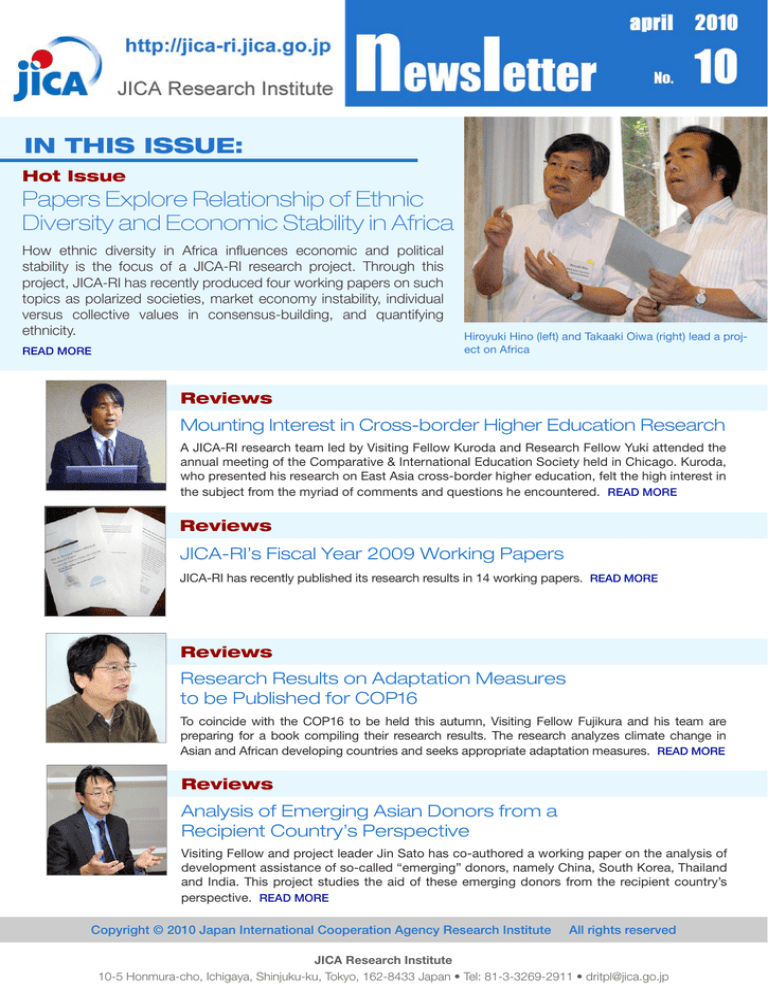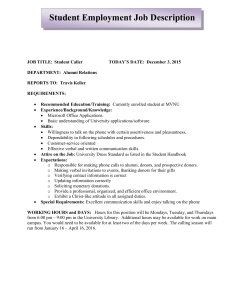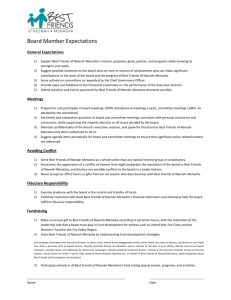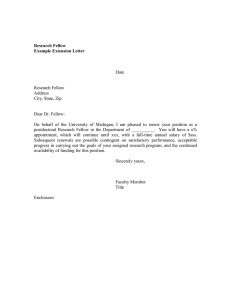
IN THIS ISSUE:
Hot Issue
Papers Explore Relationship of Ethnic
Diversity and Economic Stability in Africa
How ethnic diversity in Africa influences economic and political
stability is the focus of a JICA-RI research project. Through this
project, JICA-RI has recently produced four working papers on such
topics as polarized societies, market economy instability, individual
versus collective values in consensus-building, and quantifying
ethnicity.
READ MORE
Hiroyuki Hino (left) and Takaaki Oiwa (right) lead a project on Africa
Reviews
Mounting Interest in Cross-border Higher Education Research
A JICA-RI research team led by Visiting Fellow Kuroda and Research Fellow Yuki attended the
annual meeting of the Comparative & International Education Society held in Chicago. Kuroda,
who presented his research on East Asia cross-border higher education, felt the high interest in
the subject from the myriad of comments and questions he encountered. READ MORE
Reviews
JICA-RI’s Fiscal Year 2009 Working Papers
JICA-RI has recently published its research results in 14 working papers. READ MORE
Reviews
Research Results on Adaptation Measures
to be Published for COP16
To coincide with the COP16 to be held this autumn, Visiting Fellow Fujikura and his team are
preparing for a book compiling their research results. The research analyzes climate change in
Asian and African developing countries and seeks appropriate adaptation measures. READ MORE
Reviews
Analysis of Emerging Asian Donors from a
Recipient Country’s Perspective
Visiting Fellow and project leader Jin Sato has co-authored a working paper on the analysis of
development assistance of so-called “emerging” donors, namely China, South Korea, Thailand
and India. This project studies the aid of these emerging donors from the recipient country’s
perspective. READ MORE
Copyright © 2010 Japan International Cooperation Agency Research Institute
1
All rights reserved
Research
Institute
JICA ResearchJICA
Institute
Newsletter
No. 10 • April 2010
10-5 Honmura-cho, Ichigaya, Shinjuku-ku, Tokyo, 162-8433 Japan • Tel: 81-3-3269-2911 • dritpl@jica.go.jp
Hot Issue
Four JICA-RI Papers Explore Ethnic
Diversity and Economic Stability
Four working papers, each focusing on different
aspects of African ethnic diversity and economic
instability, have recently been published by
JICA-RI. These papers are outputs of a project
led by JICA-RI Special Fellow Hiroyuki Hino.
Gustav
Ranis,
Professor
Emeritus of Yale University,
details the behavior of polarized
societies toward public goods
provision, specifies how pre-existing conditions
such as population density and resource
abundance adversely affect development,
and mentions potential remedies to such
conditions.
Professor Anjan Mukherji of
Jawaharlal Nehru University
takes the profound question
of why the market economy
is unstable and concisely condenses his
economics-based argument into readilyunderstandable terms.
JICA-RI Special Fellow Hiroyuki Hino
Also from Jawaharlal Nehru
University, Professor Satish Jain
elaborates on the interaction
between the preferences and
values of individuals versus those of society,
and how that interaction affects consensus
building, which in turn impacts equality within a
market economy.
This joint project with Kobe University, “Ethnic
Diversity and Economic Instability in Africa,”
involves the collaborative effort of over 30
political scientists, anthropologists, historians,
psychologists and economists from around
the world to research the relationship between
ethnicity and economy. The working papers
were produced through individual research and
symposia discussions held at Kobe University
and Yale University.
Professor Graham Brown (left)
of the University of Bath and
co-author, Arnim Langer of the
University of Oxford, discuss
the increasing need for capturing ethnicity as an
empirical variable in science, the accompanying
limitations to measuring it and ways to address
such obstacles.
Consensus from the symposia discussions
affirms ethnic diversity as a determinant
for economic development, believes Hino.
“Diversity is undermining African economies
by contributing to growth reduction over time,
and through its impact on political stability,”
states Hino. “Understanding how diversity is
negatively interlinked with economy and its
channels of impact may lead to creation of
policy and institutions that transform diversity
influence into a positive one.”
“The end product of this research, we hope, will
be practical recommendations to government
and public institutions in policy making,” says
Hino, “not only to mitigate the potentially
negative impact on interactions of ethnicities,
but to transform those interactions into a
positive force in economic development.”
At this time, five experts have published their
research through JICA-RI:
More papers will be published on the JICA-RI
webpage in the near future.
2
JICA Research Institute Newsletter No. 10 • April 2010
Reviews
Mounting Interest in Cross-border
Higher Education Research
Visiting Fellow Kazuo Kuroda, Research Fellow
Takako Yuki and their research team are
studying the social and economic effects of
East Asia area cross-border higher education
(CBHE). Recently Kuroda, Yuki and team
attended the annual meeting of the Comparative
& International Education Society (CIES) in
Chicago to present on the ongoing progress
of their project, “Analysis of Higher Education
Exchange and Labor Market Integration in East
Asia.” The team also visited the World Bank in
Washington, DC.
There were many questions and comments from
the audience, and the team was approached
for possible participation at other international
conferences and academic journal article
submission. Kuroda says that, other than from
case studies, there is very little verified data
available on the internationalization of higher
education. In that sense, he could truly feel
the high expectations of peers and the strong
interest in their research, he says.
At the CIES meeting, there were many
presentations on higher education, reflecting
strong international interest in the field. Kuroda
says that the definition of internationalization
of higher education, the difficulties of indices
that measure it, and the thinness of theoretical
foundation were discussed among other things.
The team’s research should be able to contribute
to these types of issues, Kuroda says.
At the CIES annual meeting from March 1 to
5, the team presented an outline of their field
survey of on-going CBHE programs in 300
principal Asian universities and introduced
a Japan-Malaysia international joint degree
program. In addition, they reported on the
results of an analysis on the external effects of
CBHE programs on the employment situation
from a case on Malaysia.
After the CIES meeting, Yuki visited the World
Bank to exchange information and views with
related parties. Discussions on CBHE programs
being still limited within the World Bank, they
expressed strong interest in the expected
results of the team’s research.
Through this same research project, the team
published a policy brief entitled, “Toward Crossborder Higher Education and International
Cooperation in an East Asian Community”
in February of this year. The team is now
continuing its study on international exchange
of higher education in the East Asia region, and
conducting empirical studies on its effects.
Visiting Fellow Kuroda presents at CIES in Chicago
3
JICA Research Institute Newsletter No. 10 • April 2010
Reviews
JICA-RI’s Fiscal Year 2009 Working Papers
JICA-RI’s activities up to fiscal year 2009 have resulted in the publication of 14 working papers.
Here is a brief overview of the publications.
Collaboration with the Initiative for Policy
Dialogue
Ethnic Diversity & Economic Instability
This JICA-RI collaborative research project
involving over 30 researchers worldwide has
thus far produced 4 papers on the relationship
between ethnic diversity and political-economic
instability in Africa. Among the themes are
democracy, integration, measuring ethnicity,
conflicts and more. (No.6, No.7, No.8, No.9)
JICA-RI has been collaborating with the Initiative
for Policy Dialogue (IPD), founded by Joseph
Stiglitz. A working paper on Rwanda’s precarious
land tenure draws on the presentations and
discussions made at the IPD Africa Taskforce
meeting held in South Africa in July 2009.
(Working paper No.1)
Growth & Poverty Reduction in Indonesia
“Emerging” Donors and their Impact
JICA-RI’s extensive research on growth and
poverty reduction in Indonesian farming
communities has resulted in 5 working papers.
Topics include: the impact of spatial connectivity
on income growth, human capital and mobility,
environmental factors and child growth, climate
change, and decentralization. (No.10, No.11,
No.12, No.13, No.14)
JICA-RI is studying the changing face of the
international development world through the
impact of new, “emerging” donor nations in this
project. A paper has been produced comparing
the characteristics and practices of emerging
and traditional donor nations of Asia from the
recipient’s perspective. (No.2)
Infrastructure Development
JICA-RI’s
research
on
infrastructure
development has led to two working papers on
topics such as social capital formation, credit
markets, and how access to infrastructure
like irrigation contributes to poverty reduction,
based on a case from a JICA infrastructure
project in Sri Lanka aimed at alleviating poverty.
(No.3, No.4)
State-building
All papers are currently available on the JICA-RI
website with new ones to be added as projects
continue.
JICA-RI and JICA staff from other departments
have jointly produced a working paper on statebuilding in various countries in “fragile” situations.
Part of the paper has been contributed as a
background paper for the World Bank’s World
Development Report 2011. (No.5)
4
JICA Research Institute Newsletter No. 10 • April 2010
Reviews
Research Results on Adaptation Measures
to be Published for COP16
JICA-RI Visiting Fellow and project leader Ryo
Fujikura is preparing to publish a book on the
results of his team’s research project “Adaptation
to Climate Change in Developing Countries.” The
findings of the book will also be shared at the
United Nations Framework Convention on Climate
Change, 16th Conference of the Parties (COP16),
to be held in Mexico in November of this year.
measures are based on the discussions of an
interim workshop for the research project held last
year in England. Fujikura believes that the book
provides valuable information for policy makers and
practitioners from both developing and developed
countries.
Japan is committed to proactively tackling climate
change issues, and the book represents a part of
Japan’s intellectual contribution to this end. JICARI will present the book at a COP 16 side event.
This project analyzes the present condition and
future prospects of climate in African and Asian
developing countries and from this, attempts
to produce measures for adaptation and for
development.
In addition to this project, Fujikura is planning a
study with both Japanese and overseas experts
and researchers on mitigation schemes for reducing
greenhouse gas emissions in developing countries
beginning fiscal year 2010.
Fujikura says that the book summarizes adaptation
measures and issues on various levels from
international organizations to community. Such
Reviews
Analysis of Emerging Asian Donors from a
Recipient Country’s Perspective
Some critics argue that emerging donors prioritize
their own interests, and less attention is paid to
issues like poverty alleviation or environmental
conservation of the recipient countries. Sato
argues, however, that Japan’s aid also received
such criticism in the past, and that emerging
donors will most likely change for the better as
did Japan. Aid recipients value some aspects of
emerging donor aid, such as the speed of aid
delivery or the granting of broader discretionary
authority to recipient countries, more highly than
those of traditional (existing) donors, emphasizes
Sato.
Among aid recipient countries, there are
those that have been transformed into donor
countries themselves and are now providing
assistance to less developed countries. These
countries are known as “emerging donors”
and, in recent years, their aid activities have
been gaining the attention of the international
community. However, the reality behind these
activities is not readily apparent.
With such recognition, JICA-RI Visiting Fellow
Jin Sato is leading the research project “Impact
of Non-DAC Donors in Asia: a Recipient’s
Perspective.” He and his team have recently
published a working paper analyzing the aid
activities of emerging donors in Asia with
which Japan has strong ties — China, Korea,
Thailand and India.
Sato stresses that, in considering Japan’s aid and
aid harmonization among donors, it is important
to review the role of aid from the recipient
perspective, and that more effort should be spent
on creating a platform for deeper discussion
between traditional and emerging donors.
5
JICA Research Institute Newsletter No. 10 • April 2010






